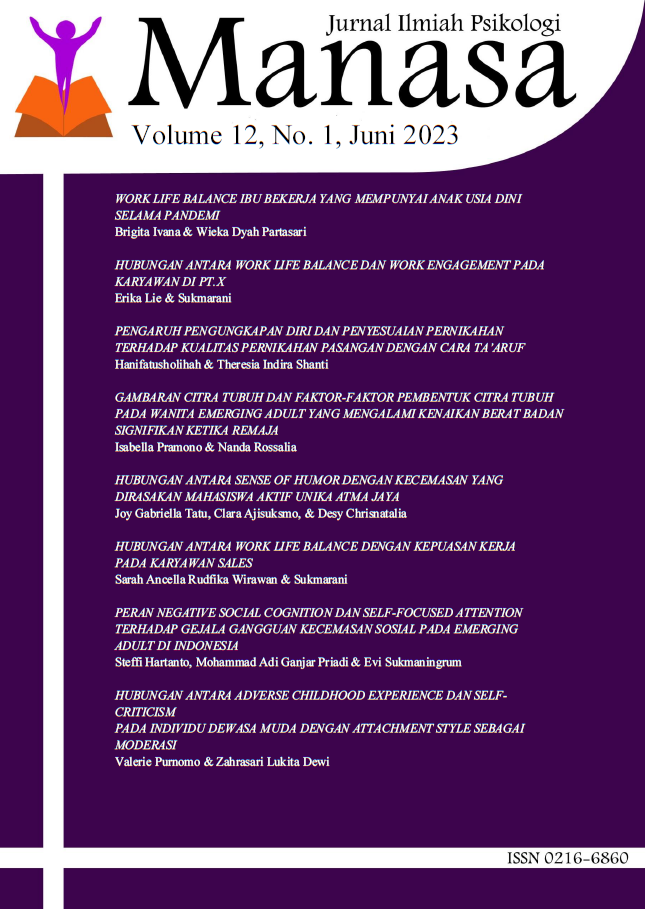HUBUNGAN ANTARA SENSE OF HUMOR DENGAN KECEMASAN YANG DIRASAKAN MAHASISWA AKTIF UNIKA ATMA JAYA
DOI:
https://doi.org/10.25170/manasa.v12i1.4343Keywords:
Sense of humor, anxiety, university studentAbstract
University students often face challenges both in the academic and non-academic fields. The pressures felt by these students can cause anxiety in students. Anxiety that exists in students can cause negative impacts that can harm students. Based on the previous research, it has been found that a sense of humor has a relationship with anxiety and can help overcome this anxiety. Therefore, this study aims to determine the relationship between a sense of humor and anxiety felt
by active students at Atma Jaya Catholic University of Indonesia (Unika). The study used a quantitative approach with a correlation research design. The subjects of this study were 396 active students at Unika Atma Jaya. The research instruments used were the Multidimensional Sense of Humor Scale (MSHS) to measure Sense of Humor and the Hamilton Anxity Rating Scale (HAM-A) to measure anxiety. The results of this study were that there was no significant relationship between Sense of Humor and the anxiety felt by active students at Unika Atma Jaya.
References
Apriandi, R. (2016). Hubungan Sense Of Humor Dengan Kecemasan Mahasiswa Dalam Menghadapi Ujian Akhir Semester V Di Fisip Ub. Sarjana thesis, Universitas Brawijaya.
Artemyeva, T. (2013). Humor as a Form of Coping Behavior among Russian Students. Middle East Journal of Scientific Research , 16(3), 348–351. https://doi.org/10.5829/idosi.mejsr.2013.16.03.11687
Asif, S., Muddassar, A., Shahzad, T. Z., Raouf, M., & Pervaiz, T. (2020). Frequency of depression, anxiety and stress among university students. Pakistan Journal of Medical Sciences, 36(5). https://doi.org/10.12669/pjms.36.5.1873
Creswell, J. W., & Creswell, J. D. (2018). Research design: Qualitative, quantitative, and mixed methods approaches. SAGE Publications, Inc.
Colom, Gloria, G. et al. (2011). Study of The Effect of Positive Humour as a Variable That Reduces Stress. Relationship of Humour with Personality and Performance Variables. Psychology in Spain, 15. Diunduh dari http://www.psychologyinspain.com/content/full/2011/15002.pdf
Edwards, K. R., & Martin, R. A. (2010). Humor creation ability and mental health: Are funny people more psychologically healthy?. Europe’s Journal of Psychology, 6(3). https://doi.org/10.5964/ejop.v6i3.213
Ericson, P. M., & Gardner, J. W. (1992). Two longitudinal studies of communication apprehension and its effects on college students' success. Communication Quarterly, 40(2), 127–137. https://doi.org/10.1080/01463379209369828
Fredrickson, B. L. (1998). What good are positive emotions? Review of General Psychology,
Karim, M. Y., Suyatmi , S., & Afifah, Z. N. (2018). Kepekaan terhadap Humor berhubungan dengan Tingkat Kecemasan Mahasiswa Fakultas Kedokteran Saat Menghadapi Ujian. Smart Medical Journal, 1(1), 14–16.
Katherine Shear, M., Bilt, J. Vander, Rucci, P., Endicott, J., Lydiard, B., Otto, M.W., ... Frank, D.M. (2001). Keandalan dan validitas Panduan Wawancara Terstruktur untuk Hamilton Anxiety Rating Scale (SIGH-A). Depresi dan Kecemasan, 13(4), 166–178. https://doi.org/10.1002/da.1033
Madhan, B., Barik, A. K., Patil, R., Gayathri, H., & Reddy, M. S. (2013). Sense of humor and its association with psychological disturbances among dental students in India. Journal of Dental Education, 77(10), 1338–1344. https://doi.org/10.1002/j.0022-0337.2013.77.10.tb05608.x
Mauriello, Matthew dan Jasmin T M. (2007). Relations of Humor with Perceptions of Stress. Psychological Report, 101, 1057-1066
Patsali, M. E., Mousa, D.-P. V., Papadopoulou, E. V. K., Papadopoulou, K. K. K., Kaparounaki, C. K., Diakogiannis, I., & Fountoulakis, K. N. (2020). University students’ changes in mental health status and determinants of behavior during the COVID-19 lockdown in Greece. Psychiatry Research, 292, 113298. https://doi.org/10.1016/j.psychres.2020.113298
Ramdan, I. M. (2018). Reliability and Validity Test of the Indonesian Version of the Hamilton Anxiety Rating Scale (HAM-A) to Measure Work-related Stress in Nursing.
Salari, N., Hosseinian-Far, A., Jalali, R., Vaisi-Raygani, A., Rasoulpoor, S., Mohammadi, M., Rasoulpoor, S., & Khaledi-Paveh, B. (2020). Prevalence of stress, anxiety, depression among the general population during the COVID-19 pandemic: A systematic review and meta-analysis. Globalization and Health, 16(1). https://doi.org/10.1186/s12992-020-00589-w
Suratmi, S., Abdullah, R., & Taufik, M. (2017). Hubungan Antara Tingkat Kecemasan dengan Hasil Belajar Mahasiswa di Program Studi Pendidikan Biologi Untirta. Jurnal Pembelajaran Biologi: Kajian Biologi Dan Pembelajarannya, 4. https://doi.org/ https://doi.org/10.36706/fpbio.v4i1.4952
Siswoyo, D., Sulistyono, T., & Dardiri, A. (2007). Ilmu Pendidikan.
Solomon, P & Patch, V. D (2005). Handbook of Psychiatry. 3rd ed. Jepang.
Thorson, J. A. & Powell, F. C. (1997). Psychological Health and Sense of Humor. Journal of Clinical Psychology. Vol. 53, No. 6: 605-619.
Vitasari, P., Wahab, M. N., Othman, A., Herawan, T., & Sinnadurai, S. K. (2010). The relationship between study anxiety and academic performance among engineering students. Procedia - Social and Behavioral Sciences, 8, 490–497. https://doi.org/10.1016/j.sbspro.2010.12.067
Zulkarnain, Z., & Novliadi, F. (2009). Sense of Humor dan Kecemasan Menghadapi Ujian di Kalangan Mahasiswa. Majalah Kedokteran Nusantara, 42(1). Retrieved from https://www.researchgate.net/publication/237841775_Sense_of_Humor_dan_Kecemasan_Menghadapi_Ujian_di_Kalangan_Mahasiswa.
Downloads
Published
Issue
Section
License
Copyright (c) 2023 MANASA

This work is licensed under a Creative Commons Attribution-NonCommercial-ShareAlike 4.0 International License.









.png)
.png)

